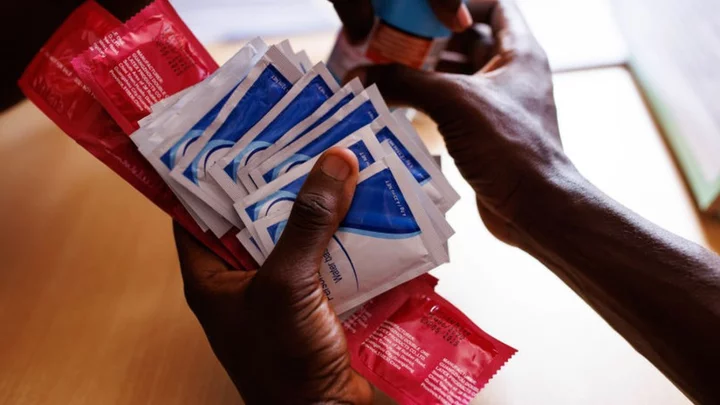
EV maker VinFast to acquire its battery maker sibling
Electric-vehicle maker VinFast Auto said on Wednesday it would acquire a 99.8% stake in battery maker VinES from
2023-10-11 22:25

Ugandan MPs reject birth control for 15-year-old girls
The deputy speaker calls the idea "devilish", saying it is not the way to tackle teenage pregnancy.
2023-10-11 22:17

Grazer is third female winner of Fat Bear Week
Grazer, the third female winner of Fat Bear Week, has two litters of cubs and beat the larger Chunk in the final.
2023-10-11 21:58

Steve Rider tells men to ‘recognise your vulnerability’ after prostate cancer diagnosis
Sports commentator Steve Rider has shared a message encouraging men to be conscious of their health after his prostate cancer diagnosis. Rider, 73, was told he had the disease last month after a biopsy. The former Grandstand and Sportsnight presenter will undergo surgery to treat it this weekend. Ahead of the operation, Rider shared some insight into his journey to diagnosis, which began when a friend was diagnosed during a routine health check. “He had a scan which showed some alarming things going on with the prostate and within a month he had the full operation and that woke everybody up because he had no symptoms and very fit guy, and roughly our age,” Rider told the PA news agency. After initially testing, Rider’s readings for cancer were “not that high”, so he’d planned not to take further action. His wife, Jane, urged him to have further tests, and a biopsy was taken. He continued: “I thought the worst that can happen is that I’m going to be monitored for the next six months or so and we got the results of the biopsy the next day and they said, ‘No, you come in as soon as you can, we’re going to operate.’” Rider said his diagnosis was aided by his friends having open conversations and his wife encouraging him to get further tested. “We do tend to treat these things a little bit like getting your eyes tested or ears done, you can put it off and maybe think ‘Well, I’ll wait till the symptoms come’. “Symptoms don’t come and when they do, it is probably too late.” He added: “The message is to recognise your vulnerability, especially with age and family history and so on. And if you do feel that you fall into those categories, then get yourself checked.” According to the charity Prostate Cancer UK, 144 men are diagnosed across the country each day – more than 52,000 per year. Rider’s former BBC colleague Bill Turnbull died in August 2022, nearly five years after being diagnosed. After sharing his diagnosis publicly in March 2018, Turnbull detailed his treatment in a Channel 4 documentary called Staying Alive. Speaking about the late broadcaster, Rider said: “The great thing about Bill was that he wanted to turn his misfortune into an information campaign which would save hundreds of others and I’m sure that probably hundreds and thousands of men have stepped back from a really serious cancer because of the attention that Bill Turnbull brought to early diagnosis and testing. “And apart from that, he was a lovely, lovely guy.” Rider found out that he had cancer the day after taking part in sports presenter Jeff Stelling’s charity Football March in Turnbull’s honour. Prostate Cancer UK has said the disease affects one in eight men in the UK and that more than 12,000 men die every year from the condition. They advise that if a man is over the age of 50, Black, or has a family history of prostate cancer that he may want to speak to a GP as these are higher risk factors. To find out more about your prostate cancer risk, or that of your partner, father or friend, you can visit Prostate Cancer UK’s website – prostatecanceruk.org/risk-checker – and try the 30-second online risk checker. Additional reporting by PA Read More Cancer cases in young people ‘are rising’ – the warning signs to look out for Jeff Stelling leads hundreds to complete Wembley to Wycombe walk in honour of Bill Turnbull Duran Duran’s Andy Taylor claims he was ‘visited by angel’ after starting new cancer treatment The psychology of Big Brother: How to survive in the house Sports culture is ‘intimidating’ and putting people off working out Israel-Hamas conflict: How to talk to teenagers about distressing news stories
2023-10-11 17:47

Sports culture is ‘intimidating’ and putting people off working out, study finds
Intimidating sports culture is putting millions off working out – as many are feeling alienated by the exercise industry. A poll of 2,000 adults who don’t exercise found 68 per cent feel too embarrassed to go to the gym because they don’t fit the mould of the “typical” gym goer. More than three-quarters (78 per cent) don’t find sports adverts motivating and 33 per cent say adverts actually put them off working out. However, 55 per cent would be more likely to exercise if they saw everyday people in sports adverts. And 20 per cent would be more inspired to do something active if there were more realistic expectations set by the industry. A further 29 per cent say sports brands aren’t relatable to them, and a quarter think exercise culture is intimidating. While 49 per cent wish they had more confidence to exercise. The research was commissioned by ASICS as part of its ‘New Personal Best’ campaign, which is calling out performance-obsessed exercise culture in partnership with mental health charity Mind. Gary Raucher, European vice president for the sportswear brand, said: “The sports industry has been telling us for years that the only thing that matters is a faster time, a longer distance, a higher score, and more reps. “Although it’s aimed at motivating people, our research shows it’s having the reverse effect and instead creates an intimidating culture that’s putting people off exercise – something we’re committed to change.” As part of the research, survey respondents were shown a series of marketing images from sportswear and athletic brands and asked to comment on how the pictures made them feel. Just over one in 10 (12 per cent) said the images made them feel ‘inferior’, 13 per cent felt intimidated and for seven per cent, the images even made them feel depressed. It was found 16 per cent typically come across these types of images on social media, with 42 per cent admitting seeing boastful exercise posts makes them feel like a failure – even before they’ve started exercising. Hayley Jarvis, head of physical activity at Mind, added: “For people who don’t exercise, taking that first step can be daunting, especially if they’re also experiencing a mental health problem. “When you add the pressure of performance so often seen in sports marketing or on social media, for some it can feel impossible to get started as they don’t feel like they’re ‘good enough’. “Getting active can play a vital role in helping us stay and live well with mental health problems.” The survey, which was conducted via OnePoll.com, also found 23 per cent of non-exercisers feel too embarrassed to start now, and nearly one in five (18 per cent) worry people would judge them as they are too unfit. Over three quarters (77 per cent) admitted they are aware of the mental health benefits of exercise. But despite 61 per cent saying they have either personally experienced a mental health problem or know someone who has, it is still not motivation enough to get them moving. Mental health activist and TV personality Dr Alex George, who is supporting the ASICS campaign, said: “As someone who is passionate about the benefits of exercise on mental health, it’s upsetting but unsurprising that people feel excluded and alienated by the sports industry. “I too have felt intimidated and insecure after comparing my performance and results to others. “People need to know that regardless of the type of exercise they do, or the times or distances they achieve, any movement benefits mental health and is something that should be celebrated.” The ‘New Personal Best’ campaign features everyday people and is encouraging them to share their own ‘personal best’ images on social media using the hashtag #NewPersonalBest on World Mental Health Day, 10th October. One of which is Tom Durnin, whose inspirational story caught the sports brand’s attention when he finished in last place at the London Marathon 2023. He said: “For me, it was all about crossing that finish line no matter how long it took me. I run purely because it makes me feel good, I don’t worry about my time or being the slowest. “I never thought I’d ever be the face of a sports campaign but I’m honoured to be partnering with ASICS to encourage more people to move for their mental health. “If my story can inspire at least one person to take the first step that’s all I could ask for.” Read More Brits reveal advice they would give their younger selves - including investing in property Girls in UK have much lower confidence than male peers, study finds Average person completes 90 online tasks a day Israel-Hamas conflict: How to talk to teenagers about distressing news stories How to get rid of bedbugs: Signs and symptoms amid threat of UK invasion How to support someone coming out in their 30s and beyond
2023-10-11 16:49

'It's a no-brainer!' Bryan Adams returning to Royal Albert Hall for 3-date run
Bryan Adams is heading back to London's Royal Albert Hall for a three-date run in May next year, and the 'Summer of 69' star admitted it was a "no-brainer" to return to the iconic venue after he had such a good time there in 2022.
2023-10-11 15:24

Uniqlo owner set for 26% profit surge on China rebound, yen slide
By Rocky Swift TOKYO The Japanese operator of global clothing chain Uniqlo is expected to blow past last
2023-10-11 14:50

Israel-Hamas conflict: How to talk to teenagers about distressing news stories
With all the access teenagers today have to the internet and social media, they may see more distressing news stories than even their parents. Palestinian militant group Hamas – deemed a terrorist group by the UK Government – invaded Israel on Saturday from Gaza, with rocket attacks by air as well as military in boats. Since then, Israel has sealed the Hamas-ruled Gaza Strip off from food, fuel, medicine and other supplies, while launching retaliatory air strikes on the territory, which is home to 2.3 million people. The most recent numbers suggest 900 people have been killed in Israel, 700 in the Gaza territory and the West Bank, and many hostages have been taken. Hamas has pledged to kill captured Israeli hostages if attacks target civilians in Gaza. The conflict has sparked protests by pro-Palastine and pro-Israel groups in the UK and prompted political division on social media. Teenagers are likely to be exposed to a lot of the news, internet discussion and perhaps distressing images of conflict. So how should parents approach this? Talk about it at home Dr Jeri Tikare, clinical psychologist at Kooth, a digital mental health platform, believes parents should be as truthful as they can with their teenagers. “This means that it is important for us to not to hide things away from them. It is better for them to hear it from us (their people of safety) as opposed to reading it or hearing it from others,” he says. “Also bearing in mind the curious nature of the mind. It is inevitable that for things that they do not understand, they might research and look for answers. “It can be helpful if they get their information from a reliable source which can feel contained and reassuring. But share information at a level that is developmentally right and just enough to help the young person feel contained and safe.” Check yourself As the parent, learn the basics of what is going in the conflict yourself from reputable sources so you can have balanced, informed conversations with your child. “It can also be useful to be aware of our own reactions as parents or primary caregivers,” he says. “One of the ways young people learn and develop is via observing and then modelling adult behaviour. Hence, they can pick up anxieties or worries displayed by parents.” Validate and normalise expressing emotion If your teen is particularly affected by distressing news stories about war and conflict, Tikare encourages parents to give their teenagers the opportunity to express how they are feeling in different ways – such as writing, drawing, stories, songs, and things that feel helpful for the young person. “Some find a feelings box helpful,” he adds. “It might also be helpful to introduce them to some simple relaxation techniques such as taking three deep, slow breaths, breathing in for a count of three and out for three.” Be there for them Giving your teenager the space, time and encouragement to open up about how they feel on any subject – world news or otherwise – is key. “I know that life can be hard, busy and sometimes young people are aware of this and might not want to disturb you,” Tikare says. “Therefore, it might be helpful to make a conscious effort to let them know that you are mindful of how difficult it can be and reassure them that you are available to talk about things. “Giving them extra love and attention at this time can be helpful, especially at difficult times like this.” Discuss social media Tikare acknowledges that television, social media and other platforms “can be very distressing and exacerbating” for teenagers. But you may not be able to prise your child away from posting on their social media accounts altogether. “It would depend on the motivation behind posting and where they are posting,” Tikare says. “Posting about the feelings experienced around the conflict in a supportive and possibly moderated space, with people sharing similar feelings associated with the conflict, can help normalise the experience and leave them feeling less alone. “On the other hand, it could also expose them to content and comments that could potentially trigger distress.” So be sure to make them aware of the content they may come across online. Read More How to support someone coming out in their 30s and beyond Autumn décor ideas for a seasonal refresh Why you shouldn’t tidy your garden too much in autumn World Mental Health Day: 5 ways to beat anxiety and change your life Alternative veg to grow for next season How to spot if your child is struggling with their mental health – and what to do next
2023-10-11 14:29

How to support someone coming out in their 30s and beyond
Coming out can be hard at any age, but by the time you’re well into adulthood it may feel terrifying, and be completely life-changing. Many people who come out in their thirties and onwards may have wanted to for a long time but not felt safe enough to do so. As October 11 marks National Coming Out Day, it’s important to reflect on how, if and when people can share their authentic selves. “I wasn’t raised in a time when it felt safe to express attraction to women,” says author and creative mentor Fiona Fletcher Reid, who came out last year at the age of 35. “I wasn’t sure about my sexuality until I had psychosexual therapy and was able to explore all the layers of internalised homophobia and repression that I had accumulated over my 35 years,” she says. So, how you can support someone who is going through it? Don’t assume everyone is the same Not every person’s coming out looks the same, and some LGBTQ+ experiences are not universal. “Coming out is a personal experience and because it is often physically and emotionally dangerous to be openly queer, lots of people never feel able to be open,” says Fletcher Reid, now 36. “Some people might feel free to come out once they have ended a particular relationship, or after meeting people who they feel safe around. “For others, like me, it’s that we don’t consciously acknowledge our sexuality until we are a lot older and have the confidence to work through the emotional implications and real-life consequences that come with that,” The writer, from Glasgow, was going through a divorce at the time with a man she’d been with since the age of 17. “During therapy, I talked a lot about the pain I was experiencing during intercourse as well as my general anxiety around sex. It wasn’t until I’d built up a trusting relationship with my therapist that I felt able to discuss the fact that I thought I might be gay and I did not expect that to come up, so I was just as surprised as everyone else when I came out.” Don’t question their authenticity Validate what the person who has come out is saying. “Don’t say, ‘Are you sure?’ because you can rest assured that the person coming out to you has thought long and hard about this,” says Fletcher Reid. “Casting self-doubt on someone when they have opened up a vulnerable part of themselves to you is hurtful.” Don’t question them about their sex life It’s no one else’s business. “Please don’t ask about whether they have been intimate with anyone, or any other sort of suggestion that they need to ‘prove’ their sexuality to you,” she stresses. Consider what they feel and accept that it is a big deal They are probably feeling “a mix of emotions, including excited, happy, empowered and scared for their safety”, says Fletcher Reid. “Sadly coming out can still cause huge ruptures in relationships so be aware that this is a huge moment for them and comes with real consequences. “Dismissing their experience as ‘not a big deal’ because you think it’s ‘normal to be gay’ now is a dangerous and false narrative.” It may sound simple, but just listening and supporting them is vital. “Be there to listen and try to celebrate all the new things that they are exploring as they come out, whether that’s dating, meeting new people or finding ways to experiment with their identity through fashion,” says Fletcher Reid. “Repeat often that you love and care for them and that you accept this evolution of them, that you are happy to see them happy.” Suggest they find community “Encourage them to talk to other people who have been through similar experiences if you can,” she says. “As much as friends and family want to understand what they are going through, it is far more validating to talk to someone else who has come out later in life and understands the emotional intricacies of the experience. “They can also hopefully show them that there are good times ahead.” Thank them for sharing with you “It is a privilege that someone trusts you with coming out, especially later in life. Tell them that you are honoured to have been trusted with this information, and reassure them that you will keep it private until they are ready to tell other people,” Fletcher Reid suggests. “The best reactions that I had from people were seeing their joy that I had discovered this important part of myself, and that had a huge impact on my ability to feel hopeful amidst the pain caused by my divorce. “Allowing them to feel conflicted and guilty and offering reassurance that they have the right to be themselves will make them feel so much happier.” Read More Israel-Hamas conflict: How to talk to teenagers about distressing news stories Autumn décor ideas for a seasonal refresh Why you shouldn’t tidy your garden too much in autumn World Mental Health Day: 5 ways to beat anxiety and change your life Alternative veg to grow for next season How to spot if your child is struggling with their mental health – and what to do next
2023-10-11 13:54

Republicans must overcome deep splits to choose a speaker as Israel crisis exposes failure to govern
House Republicans must mend gaping splits in their conference if they are to succeed in picking a new speaker -- as dangerous global crises in Israel and Ukraine expose the steep cost of their malfunctioning majority.
2023-10-11 12:30

Children found 'butchered' in Israeli kibbutz, as horror of Hamas' attack on border communities begins to emerge
Bodies of Israeli residents and Palestinian militants lay outside of burned-out homes in the Israeli kibbutz Kfar Aza on Tuesday, days after Hamas launched a large-scale surprise assault on Israel, sending heavily armed fighters pouring across the border from Gaza and rampaging through rural communities.
2023-10-11 11:17

Hurricane Lidia makes landfall in west-central Mexico as an "extremely dangerous" Category 4 storm
Hurricane Lidia made landfall in west-central Mexico Tuesday as an "extremely dangerous" category 4 storm, bringing fierce winds and heavy rain to the area and threatening significant flooding, according to the National Hurricane Center.
2023-10-11 08:22
